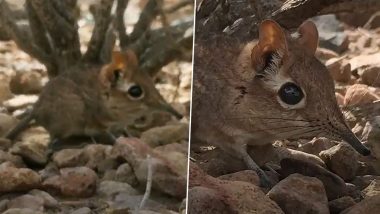After being lost to science for about 52 years, the Somali Sengi, also called, Elephantulus revoilii, was rediscovered in Djibouti, a country in East Africa. Researchers consider the finding to be one of the most significant developments in the field of science in recent times. Thought as a ‘lost species,’ for many years, the creature was found alive and well in Djibouti during a scientific expedition. Experts have posted videos and pictures of the palm-sized elephant relative that shows species of sengi, with its long and flexible nose that it waggles to and fro. The research team also discovered that Somali sengis have no immediate threats and neither its habitat, which is inaccessible and far from farming and human developments. Dhole, Rare Whistling Dog Spotted in Gujarat, India For The First Time in 50 Years During Lockdown is Another Example of Animals Reclaiming The World!
Elephant shrews, also called jumping shrews are small insectivorous mammals native to Africa. Their traditional common name, “elephant shrew,” comes from a perceived resemblance between their long noses and the trunk of an elephant, and their superficial similarity with shrews. One of its species, Somali Sengi, was reportedly last seen in the late 1960s. Only about three dozen historical specimens existed in museums. The species was previously known only from Somalia, hence its name. That made the sengi among the top 25 most-wanted in the Global Wildlife Conservation’s Search for Lost Species initiative.
Watch Video of Somali Sengi:
FOUND: What is related to an elephant but the size of a mouse, has hindlimbs built like a gazelle, & was lost to science since 1968? The Somali Sengi, an adorable elephant-shrew was recently rediscovered in Djibouti. @DukeLemurCenterhttps://t.co/xSZYutT0CT pic.twitter.com/NJZs0Kx21g
— Global Wildlife Conservation (@Global_Wildlife) August 18, 2020
Last year, Duke Lemur Center researcher Steven Heritage, and a small team of other zoologists including Galen Rathbun from the California Academy of Sciences and Houssein Rayaleh from Association Djibouti Nature began their research to see if the Somali Sengi was still around, somewhere in eastern Africa. Much to their surprise, they found about eight Somali Sengis during their expedition and obtained the first-ever photos and videos of live Somali elephant shrews. Houssein Rayaleh, a Djiboutian research ecologist and conservationist, said, people living in Djibouti never considered the sengis to be ‘lost,’ the new research brings the Somali sengi back into the scientific community, which is significantly valued.
To spot the species, the researchers explained in the study that they set more than 1,000 traps at 12 locations, baiting the traps with a concoction of peanut butter, oatmeal and yeast. During their expedition, they did not observe any immediate threats to the species, which is another great news. The scientists plan to launch another journey in 2022 to GPS radio-tag individual sengis to study their behaviour and ecology.
(The above story first appeared on LatestLY on Aug 19, 2020 12:53 PM IST. For more news and updates on politics, world, sports, entertainment and lifestyle, log on to our website latestly.com).













 Quickly
Quickly





















